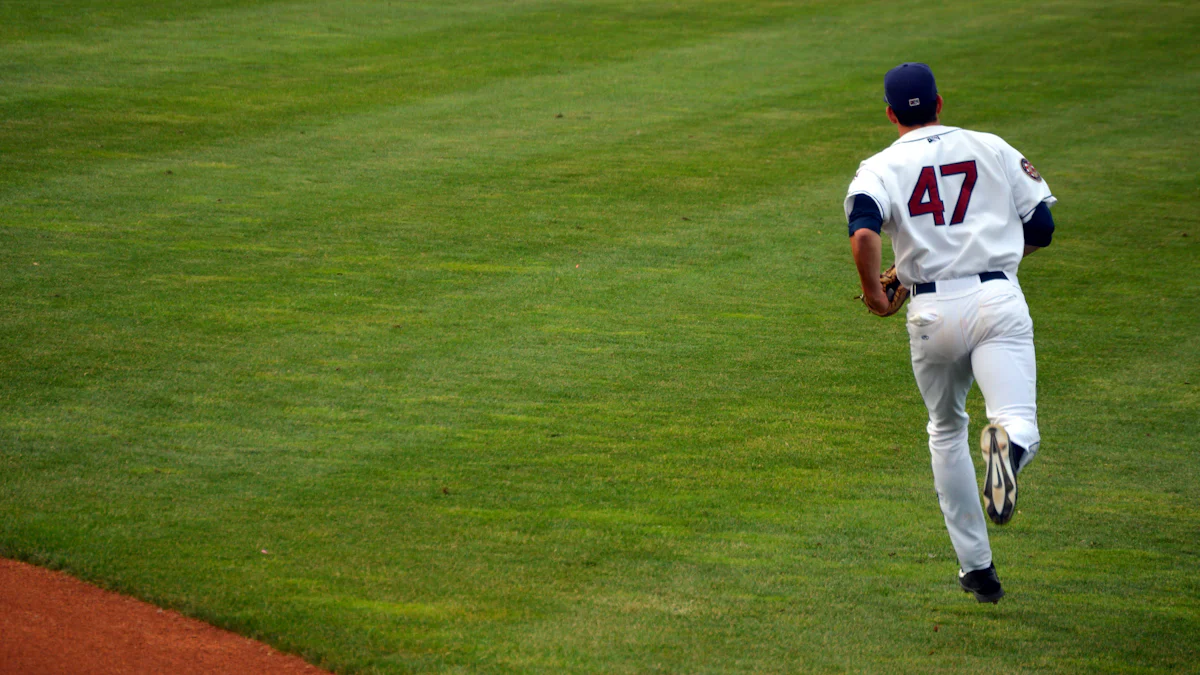
Rest plays a critical role in the success of baseball players. It allows your body to recover from the physical demands of the game and helps prevent injuries caused by overuse. Understanding what is a rest day inside of baseball terms is essential for maintaining peak performance. Rest days are not just about taking time off; they are about giving your muscles and mind the chance to repair and recharge. The power of rest lies in its ability to enhance your endurance, sharpen your focus, and sustain your long-term health as an athlete.
Key Takeaways
Rest is essential for muscle recovery, helping to repair damage from intense physical activity and reducing soreness.
Regular rest days significantly lower the risk of overuse injuries, allowing athletes to maintain their health and performance throughout the season.
Adequate rest enhances athletic performance by replenishing energy stores, improving strength, speed, and agility on game day.
Mental recovery is just as important; well-rested players exhibit better focus, quicker decision-making, and improved emotional well-being.
Incorporate active recovery techniques, such as light stretching or yoga, to promote healing while keeping your body engaged.
Prioritize quality sleep by establishing a consistent routine to maximize recovery and overall athletic success.
Neglecting rest can lead to increased injuries, reduced performance, and prolonged recovery times, ultimately impacting your career.
Physical Benefits of Rest

Recovery and Muscle Repair
Rest plays a vital role in helping your muscles recover after intense physical activity. When you take time to rest, your body repairs the microscopic tears in muscle fibers caused by strenuous movements like pitching or batting. This process not only reduces soreness but also strengthens your muscles, preparing them for future challenges. Studies show that recovery periods of 72 hours or more can restore normal joint function and alleviate muscle soreness, which is essential for maintaining your physical health.
The importance of recovery cannot be overstated. Without adequate rest, your muscles remain fatigued, which can hinder your ability to perform at your best. By prioritizing rest, you allow your body to rebuild and recharge, ensuring you stay ready for the demands of the game. This approach helps you achieve optimal performance consistently throughout the season.
Injury Prevention
Rest is one of the most effective tools for avoiding overuse injuries and chronic conditions. Baseball players often repeat the same motions, such as throwing or swinging, which can strain specific muscle groups over time. Taking regular rest days gives your body the chance to heal and prevents the accumulation of stress that leads to injuries. Research highlights that starting pitchers with more than five rest days between games experience fewer musculoskeletal injuries, emphasizing the value of rest in protecting your body.
Examples from youth baseball also underline the importance of rest. Young athletes who lack proper recovery time are more prone to injuries during growth spurts. Ensuring adequate rest between games and practices can safeguard your long-term health and keep you on the field.
Performance Enhancement
The connection between rest and improved athletic abilities is undeniable. Rest allows your body to replenish energy stores, such as glycogen, which fuels your movements during games. This replenishment directly impacts your strength, speed, and agility, enabling you to perform at your peak. Without sufficient rest, fatigue sets in, slowing your reaction times and diminishing your skills.
The power of rest becomes evident on game day. Well-rested players often display sharper focus, quicker reflexes, and better overall performance. By incorporating rest into your routine, you set yourself up for success, ensuring you can meet the physical and mental demands of baseball. Rest is not just about avoiding exhaustion; it’s about maximizing performance and staying ahead of the competition.
Mental Benefits of Rest
Improved Focus and Decision-Making
Rest plays a crucial role in sharpening your cognitive abilities. Baseball demands quick thinking and precise decision-making, especially during high-pressure moments. When you rest, your brain gets the chance to recharge, improving your reaction times and mental clarity. This mental recovery ensures that you can process information faster and make better decisions on the field.
“Recovery isn’t just physical—mental recovery is equally important. Baseball is a game of strategy and focus, and mental fatigue can significantly impair a player’s decision-making abilities.”
— Sports Psychology Expert
In high-stakes situations, such as deciding whether to swing at a pitch or determining the best defensive play, a well-rested mind gives you the edge. By prioritizing rest, you enhance your ability to stay calm, think strategically, and execute your game plan effectively.
Emotional Well-Being
The benefits of rest extend beyond physical recovery. Rest days help you manage stress and maintain a positive mindset. Constant training and competition can take a toll on your emotional health, leading to frustration or even burnout. Taking time to rest allows you to reset emotionally, ensuring you approach each game with renewed enthusiasm.
“Rest and easy days also have a profound impact on mental well-being. Baseball is a mentally demanding sport, requiring focus, concentration, and emotional control. Players need time to recharge and refocus, especially after intense games or training sessions.”
— Sports Psychology Expert
Rest also prevents emotional exhaustion by giving you the opportunity to step away from the game temporarily. This break helps you build resilience and maintain a healthy balance between your athletic goals and personal life. Spending time with family, pursuing hobbies, or simply relaxing can contribute to your overall physical and emotional well-being.
Burnout Prevention
Recognizing the signs of burnout is essential for every baseball player. Overtraining can lead to a loss of motivation, mental fatigue, and decreased performance. Rest acts as a safeguard against these challenges, allowing you to recharge both physically and mentally. By incorporating regular rest days into your routine, you can avoid the pitfalls of overtraining and maintain your passion for the sport.
“Young athletes can recharge their mental batteries, refocus their goals, and maintain a healthy passion for the sport by taking regular pauses.”
— Sports Psychology Expert
Rest keeps you motivated and ready to tackle the demands of the game. It ensures that you stay energized and focused throughout the season, reducing the risk of burnout and helping you perform at your best. The power of rest lies in its ability to sustain your physical and emotional well-being, keeping you game-ready and passionate about baseball.
Consequences of Neglecting Rest
Increased Risk of Injuries
Neglecting rest can significantly increase your risk of injuries. Baseball players often push their bodies to the limit, but without proper recovery, the likelihood of overuse injuries rises. Repeated motions, such as pitching or swinging, place immense strain on your muscles and joints. Fatigue amplifies this strain, making you more vulnerable to conditions like tendonitis, strains, and pulls. For example, youth baseball pitchers who play year-round without adequate days off frequently experience shoulder and elbow injuries. These injuries often require extensive rehabilitation, such as Tommy John surgery, which can sideline players for months.
The long-term impact of insufficient rest can derail your career. Chronic injuries caused by overtraining may lead to reduced mobility, persistent pain, or even early retirement. By prioritizing multiple days of rest, you give your body the chance to repair and rebuild, reducing the risk of long-term damage. Rest is not just a break; it is an essential part of staying healthy and extending your time on the field.
Reduced Performance
Fatigue directly affects your ability to perform at your best. When you neglect rest, your reaction times slow, and your precision diminishes. This can impact critical aspects of your game, such as batting, pitching, and fielding. For pitchers, fatigue can lead to decreased velocity and accuracy, which compromises pitcher performance. Similarly, batters may struggle to connect with the ball due to slower reflexes and reduced focus.
Inadequate rest also affects team outcomes. Poor individual performance can lead to missed opportunities during games, ultimately impacting your team’s success. Baseball players who prioritize recovery and incorporate multiple days of rest into their schedules often maintain higher levels of performance throughout the season. Rest ensures that you stay sharp, agile, and ready to contribute to your team’s victories.
Prolonged Recovery Times
Skipping rest days can delay your recovery from injuries. When you fail to allow your body sufficient time to heal, minor injuries can escalate into more severe conditions. For instance, a strained muscle that does not receive adequate rest may develop into a tear, requiring weeks or even months of recovery. This delay not only keeps you off the field but also disrupts your training and progress.
Over the course of a season, the cumulative effects of inadequate rest become evident. Persistent fatigue and untreated injuries can lead to a decline in overall performance. Baseball players who neglect rest often find themselves struggling to keep up with the demands of the game. By incorporating rest into your routine, you can avoid prolonged recovery times and ensure consistent performance throughout the season.
Effective Rest Day Strategies

Incorporating rest into your routine is essential for maintaining peak performance and avoiding injuries. By following effective rest day strategies, you can ensure your body and mind recover properly, keeping you ready for the demands of baseball.
Scheduling Rest Days
Planning your rest days requires careful consideration of your training and game schedules. During the season, you should schedule rest days strategically to allow your body to recover from intense games and practices. For example, pitchers often benefit from multiple days off between starts to reduce the risk of overuse injuries. Research shows that starting pitchers with more than five rest days experience fewer musculoskeletal injuries, highlighting the importance of proper scheduling.
In the off-season, rest days remain just as important. Use this time to focus on long-term recovery and rebuilding your strength. Balance your rest days with light training sessions to maintain your fitness without overloading your body. Consistent rest throughout the year helps you stay healthy and prepared for the next season.
Active Recovery Techniques
Rest doesn’t always mean complete inactivity. Active recovery involves engaging in light activities that promote muscle repair and flexibility. Stretching, yoga, and low-intensity exercises are excellent options for active recovery. These activities improve blood flow to your muscles, helping them heal faster and reducing soreness.
Active recovery also supports your overall flexibility and mobility, which are crucial for baseball players. Incorporating activities like swimming or cycling into your routine can keep your body moving without adding strain. By including active recovery in your rest days, you enhance your physical health while still giving your body the break it needs.
Sleep Optimization
Quality sleep is one of the most effective ways to support recovery. Sleep allows your body to repair tissues, replenish energy stores, and prepare for the next day’s challenges. Baseball players who prioritize sleep often experience better performance and reduced injury risks.
To optimize your sleep, establish a consistent bedtime routine. Avoid screens before bed, create a comfortable sleep environment, and aim for 7-9 hours of uninterrupted sleep each night. These habits improve the quality of your rest, ensuring your body gets the recovery it needs. Sleep is not just about feeling rested; it’s a critical component of your overall health and athletic success.
By incorporating rest and active recovery into your routine, you can maximize your performance and longevity in baseball. Effective rest day strategies, such as scheduling rest days, engaging in active recovery, and optimizing sleep, ensure you stay at the top of your game.
The power of rest is a game-changer for baseball players. It strengthens your body, sharpens your mind, and keeps you motivated throughout the season. By understanding what a rest day means in baseball terms, you can make smarter decisions about recovery. Effective strategies like scheduling days off, practicing active recovery, and optimizing sleep help you reduce injury risks and maintain peak performance. Rest is not a luxury—it’s a necessity for long-term success. Prioritizing it ensures you stay healthy, focused, and ready to excel on the field.
FAQ
What are some key recovery practices for baseball players?
Baseball players should adopt recovery strategies that address both physical and mental needs. Focus on proper nutrition to fuel your body with the right nutrients. Prioritize adequate sleep to allow your muscles and mind to recover fully. Incorporate cold therapy, such as ice baths, to reduce inflammation and soreness. Physical therapy can help address specific injuries or imbalances. Active recovery, like light stretching or yoga, promotes blood flow and flexibility, aiding in faster recovery.
How can you incorporate rest and easy days into your schedule?
To include rest and easy days in your routine, plan them around your training and game schedules. Use these days for active recovery activities, such as yoga or light stretching, to keep your body moving without overexertion. Pay attention to signs of fatigue and adjust your schedule accordingly. Make sleep a priority, as it plays a crucial role in recovery. Listening to your body ensures you stay refreshed and ready for peak performance.
Why is sleep important for baseball players?
Sleep is essential for recovery and performance. During sleep, your body repairs tissues, replenishes energy stores, and strengthens your immune system. Lack of sleep can lead to slower reaction times, reduced focus, and increased injury risks. Aim for 7-9 hours of quality sleep each night. Create a consistent bedtime routine and a comfortable sleep environment to maximize the benefits of rest.
What is active recovery, and how does it help?
Active recovery involves low-intensity activities that promote muscle repair and flexibility. Activities like stretching, yoga, swimming, or cycling improve blood circulation, reduce soreness, and enhance mobility. Unlike complete rest, active recovery keeps your body engaged while allowing it to heal. It’s an effective way to recover without losing momentum in your training.
How do rest days prevent injuries?
Rest days give your body time to heal from the repetitive motions and physical demands of baseball. Without rest, overuse injuries like tendonitis or muscle strains become more likely. Regular rest reduces accumulated stress on muscles and joints, lowering the risk of chronic conditions. For pitchers, multiple rest days between games significantly decrease the chances of musculoskeletal injuries.
Can overtraining lead to burnout?
Yes, overtraining can cause both physical and mental burnout. When you push your body without adequate rest, you risk losing motivation, experiencing mental fatigue, and seeing a decline in performance. Rest days act as a safeguard, helping you recharge and maintain your passion for the sport. Taking breaks ensures you stay energized and focused throughout the season.
How does rest improve mental focus during games?
Rest allows your brain to recover, sharpening your cognitive abilities. Baseball requires quick thinking and precise decision-making, especially in high-pressure situations. A well-rested mind processes information faster and reacts more effectively. By prioritizing rest, you enhance your focus and make better decisions on the field.
What are the signs that you need more rest?
Common signs include persistent fatigue, decreased performance, slower reaction times, and increased soreness. Emotional symptoms like irritability or lack of motivation may also indicate the need for rest. If you notice these signs, adjust your schedule to include more recovery time. Ignoring them can lead to injuries or burnout.
How can proper nutrition support recovery?
Nutrition plays a vital role in recovery. Consuming a balanced diet with proteins, carbohydrates, and healthy fats helps repair muscles and replenish energy stores. Hydration is equally important for maintaining performance and aiding recovery. After games or intense training, focus on meals rich in nutrients to speed up the recovery process.
Is it okay to take complete rest days without any activity?
Yes, complete rest days are beneficial when your body feels particularly fatigued or after intense games. These days allow your muscles and mind to recover fully. However, balance is key. Incorporate active recovery on other rest days to maintain flexibility and circulation. Listen to your body to determine when complete rest is necessary.

